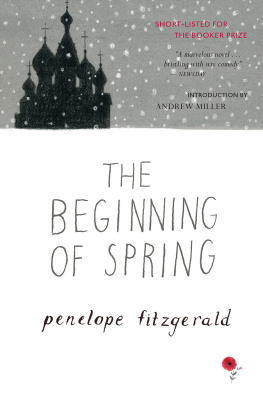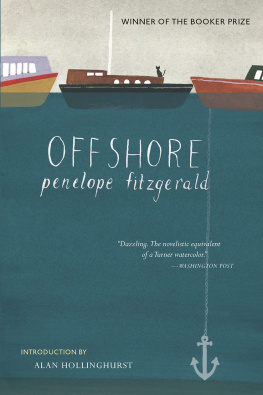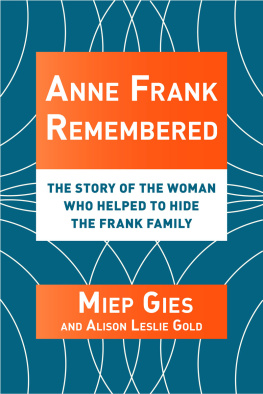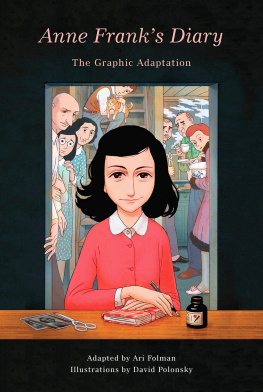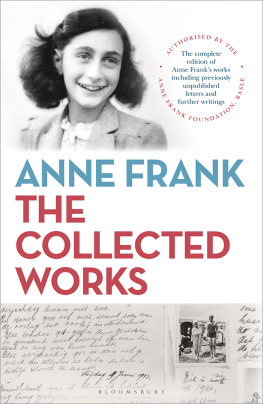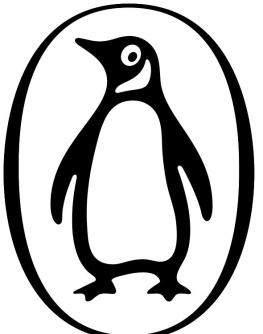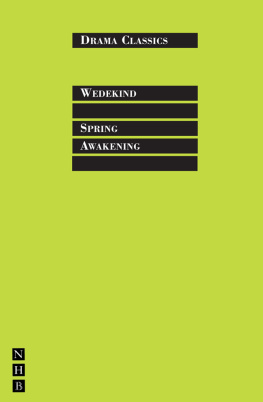Copyright 1988 by Penelope Fitzgerald
Introduction copyright 2014 by Andrew Miller
Preface copyright 2013 by Hermione Lee
Second Mariner Books edition 2015
First published in Great Britain by Collins in 1988
Reprinted by arrangement with HarperCollins Publishers
all rights reserved
For information about permission to reproduce selections from this book, write to Permissions, Houghton Mifflin Harcourt Publishing Company, 215 Park Avenue South, New York, New York 10003.
www.hmhco.com
The Library of Congress has cataloged the print edition as follows:
Fitzgerald, Penelope.
Beginning of spring / Penelope Fitzgerald.1st Mariner Books ed.
p. cm.
A Mariner book.
ISBN 978-0-544-48411-5 (pbk.)
1. BritishRussia (Federation)MoscowHistory20th centuryFiction. 2. RussiaHistoryNicholas II, 18941917Fiction. I. Title.
PR6056.186B4 199s
823'.914dc21 98-40797 cip
e ISBN 978-0-547-52479-5
v2.0415
Authors note: I should like to thank Harvey Pitcher for allowing me to use some details from his book The Smiths of Moscow (Swallow House, 1984).
Penelope Fitzgerald:
Preface by Hermione Lee, Advisory Editor
When Penelope Fitzgerald unexpectedly won the Booker Prize with Offshore, in 1979, at the age of sixty-three, she said to her friends: I knew I was an outsider. The people she wrote about in her novels and biographies were outsiders, too: misfits, romantic artists, hopeful failures, misunderstood lovers, orphans and oddities. She was drawn to unsettled characters who lived on the edges. She wrote about the vulnerable and the unprivileged, children, women trying to cope on their own, gentle, muddled, unsuccessful men. Her view of the world was that it divided into exterminators and exterminatees. She would say: I am drawn to people who seem to have been born defeated or even profoundly lost. She was a humorous writer with a tragic sense of life.
Outsiders in literature were close to her heart, too. She was fond of underrated, idiosyncratic writers with distinctive voices, like the novelist J. L. Carr, or Harold Monro of the Poetry Bookshop, or the remarkable and tragic poet Charlotte Mew. The publisher Viragos enterprise of bringing neglected women writers back to life appealed to her, and under their imprint she championed the nineteenth-century novelist Margaret Oliphant. She enjoyed eccentrics like Stevie Smith. She liked writers, and people, who stood at an odd angle to the world.
The child of an unusual, literary, middle-class English family, she inherited the Evangelical principles of her bishop grandfathers and the qualities of her Knox father and uncles: integrity, austerity, understatement, brilliance and a laconic, wry sense of humour.
She did not expect success, though she knew her own worth. Her writing career was not a usual one. She began publishing late in her life, around sixty, and in twenty years she published nine novels, three biographies and many essays and reviews. She changed publisher four times when she started publishing, before settling with Collins, and she never had an agent to look after her interests, though her publishers mostly became her friends and advocates. She was a dark horse, whose Booker Prize, with her third novel, was a surprise to everyone. But, by the end of her life, she had been shortlisted for it several times, had won a number of other British prizes, was a well-known figure on the literary scene, and became famous, at eighty, with the publication of The Blue Flower and its winning, in the United States, the National Book Critics Circle Award.
Yet she always had a quiet reputation. She was a novelist with a passionate following of careful readers, not a big name. She wrote compact, subtle novels. They are funny, but they are also dark. They are eloquent and clear, but also elusive and indirect. They leave a great deal unsaid. Whether she was drawing on the experiences of her own lifeworking for the BBC in the Blitz, helping to make a go of a small-town Suffolk bookshop, living on a leaky barge on the Thames in the 1960s, teaching children at a stage-schoolor, in her last four great novels, going back in time and sometimes out of England to historical periods which she evoked with astonishing authenticityshe created whole worlds with striking economy. Her books inhabit a small space, but seem, magically, to reach out beyond it.
After her death at eighty-three, in 2000, there might have been a danger of this extraordinary voice fading away into silence and neglect. But she has been kept from oblivion by her executors and her admirers. The posthumous publication of her stories, essays and letters is now being followed by a biography (Penelope Fitzgerald: A Life, by Hermione Lee, Chatto & Windus, 2013), and by these very welcome reissues of her work. The fine writers who have done introductions to these new editions show what a distinguished following she has. I hope that many new readers will now discover, and fall in love with, the work of one of the most spellbinding English novelists of the twentieth century.
Introduction
For a long time I had a picture of Penelope Fitzgerald pinned above my desk, something Id cut out of the book pages of a newspaper and that always looked a little crumpled and fragile. It was the photograph that is used everywhere, a head-and-shoulders shot in which she looks out of the frame with a slight and slightly tired smile. The photographer (or so I imagine it) has encouraged her to put a hand against the side of her head in a way that is thought to enliven this sort of picture. She is, I suppose, in her late sixties, its hard to tell. Shes wearing a striped blouse buttoned to the neck, a black cardigan, puffy in the sleeves, and theres a glimpse of something worn under the blouse, something warm, as if the picture was taken in a cold house on a cold day. Did she enjoy having her picture taken? Probably not; I dont know many writers who do. But something comes over, carried in the tension between the coolly assessing gaze and that half-smile, the lips closed but not tightly. A mouth ready to speak, perhaps to laugh out-loud.
It is foolish, of course, to read things into a picture of someone you do not know, though I did meet her once, an evening in autumn 1995 when she came to Waterstones in Bath to read from her latest (and as it turned out her last) novel, The Blue Flower. I was in my early thirties and most of the way through writing my first novel. I was also, other than the bearded bookseller overseeing the wine, the only male at the event. There were not many of us there. I sat at the end of a row near the back. Penelope Fitzgerald I mistook at first for one of the audience. Then she was suddenly alone on the one chair facing our direction and she smiled, spoke quietly but clearly and seemed interested in us. Was there, she asked, anyone in the audience who was writing their own book? I dont know if she really expected a hand to go up but for a few seconds I was aware of her gaze moving quickly among us and for the briefest moment she paused as she came to mea pause that, almost certainly, had no cause other than my gender and relative youthfulnessbut I felt seen, and immediately took the moment as evidence of my possessing a secret writerly soul, hidden from most but not from her.
Though grateful to her, and glad to have been there, I did not run home that night with an armful of her booksall signedand bury myself in them. More than a year passed before I started to read her seriously and have that rush of excitement that comes all too rarely in a reading lifetime. I started with the late novelsInnocence, The Beginning of Spring, The Gate of Angels, The Blue Flowerand these, in truth, remain my favourites. I couldnt think why I had not properly known about her before, had not known how extraordinarily good she is. Why wasnt everyone talking about her? Why had that reading in Bath not been standing room only?
Next page
